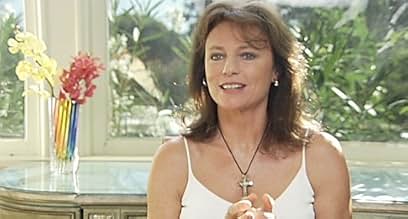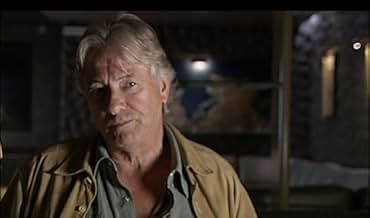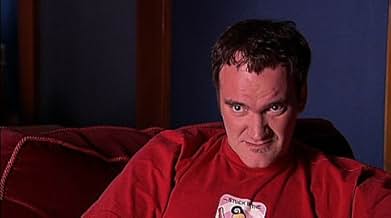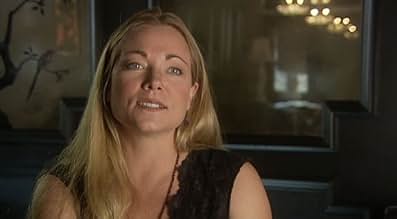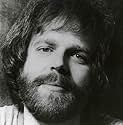Z Channel, une magnifique obsession
Original title: Z Channel: A Magnificent Obsession
IMDb RATING
7.6/10
1.9K
YOUR RATING
The story of Z Channel, one of the first U.S. pay cable stations and its programming chief, Jerry Harvey. Debuting in 1974 in LA, their eclectic slate of movies became a prime example of the... Read allThe story of Z Channel, one of the first U.S. pay cable stations and its programming chief, Jerry Harvey. Debuting in 1974 in LA, their eclectic slate of movies became a prime example of the untapped power of cable television.The story of Z Channel, one of the first U.S. pay cable stations and its programming chief, Jerry Harvey. Debuting in 1974 in LA, their eclectic slate of movies became a prime example of the untapped power of cable television.
- Awards
- 1 win & 1 nomination total
Jerry Harvey
- Self - Program Director, Z Channel
- (archive footage)
Featured reviews
Z Channel was a Los Angeles pay-tv channel run by one Jerry Harvey. His devotion to cinema as art, broadcasting uncut (directors' versions) of films or other worthy efforts sidelined by the studios or TV channels that interspersed them with advertising, earned him the enduring respect of a multitude of Hollywood greats, many of whom are interviewed in this touching movie. One wonders if he had lived in France or even Latin America perhaps their might have been a public outcry to defend an institution he created, rather than lawsuits. In USA and Britain there is a lethargy, an apathy for cinema as art art is viewed as almost a luxury item, something that is nice but hardly necessary. What do we need to do to ignite a fire in the hearts of students and film aficionados? What do we need to do to bring about a cultural revolution where the people who appreciate art can nurture and control it, rather than those that make money from it, or government ministers of culture' who, lacking sufficient conviction themselves, are also unable to effectively encourage art. During the French New Wave, students took to the streets to defend a cinema. In Rio de Janeiro, the main arthouse cinema bookshop sells two kinds of books those on cinema and those on philosophy. These examples show a different kind of cinema-going public: a thinking, educated viewer who probably sees cinema firstly as art, as a source of ideas and inspiration. This film shows that such people exist even in the USA. It is a valuable document and perhaps shows the way forward in consumer-orientated cultures where the jaded palates of the citizens have little collective desire for good cinema.
For any of us who grew up with cable being a basic amenity and movies at our disposal with the dozens of premium movie channels, Blockbusters on every corner and now DVDs on our doorstep with the click of a mouse button, it is hard to imagine that there was a time when movie lovers were limited to seeing edited versions of commercial films on network television, blank VHS tapes cost $20 apiece (true story my Dad used to have to choose the films he taped very wisely) and the only easy way to see a film was when it came to the local movie theater. In 1974, however, the first pay-channel appeared on West Coast cable boxes, with a programming director who had a genuine love of films and filmmakers; this channel was called the Z Channel, and very fittingly, Alexandra Cassevetes (daughter of John and Gena Rowlands) created an incredibly fascinating film documenting its rise and fall.
Jerry Harvey was a college dropout who intensely loved film and film studies, making him the ideal choice for deciding what films would appear on Z Channel. Various former co-workers, critics, directors and actors, mostly independents, offer their fond memories of a channel that had the power to make or break a film or filmmaker. (Cassavetes includes a story about how one of Hollywood's most infamous film debacles, "Heaven's Gate" ended up being ridiculed because of terrible editing; when Z Channel ran the director's cut it was heralded by the public and critics alike.) The vision that Harvey had for the channel and the output it had is envious even by today's standards. They would have Bergman film festivals, uncut versions of films that had only been seen in their edited format, cult and avant garde films; and directors like Alexander Payne (sporting an old Z Channel t-shirt) and Quentin Tarantino share their memories of having tapes of old Z channel broadcasts.
Unfortunately, personal demons and a family history of psychological issues ended Jerry Harvey's life and the life of his wife when he first killed her then killed himself. This was shortly after the eventual demise of the Z channel itself, which first sold out and shared programming with ESPN, and then was dissolved altogether. Despite its unceremonious demise, Z channel is remembered fondly by those that experienced its programming and were involved in its broadcasting, and is looked upon with reverence by anyone who considers themselves, like Jerry Harvey, a life-long student of film. This is an excellent documentary and really is a must-see for film buffs. 8/10 --Shelly
Jerry Harvey was a college dropout who intensely loved film and film studies, making him the ideal choice for deciding what films would appear on Z Channel. Various former co-workers, critics, directors and actors, mostly independents, offer their fond memories of a channel that had the power to make or break a film or filmmaker. (Cassavetes includes a story about how one of Hollywood's most infamous film debacles, "Heaven's Gate" ended up being ridiculed because of terrible editing; when Z Channel ran the director's cut it was heralded by the public and critics alike.) The vision that Harvey had for the channel and the output it had is envious even by today's standards. They would have Bergman film festivals, uncut versions of films that had only been seen in their edited format, cult and avant garde films; and directors like Alexander Payne (sporting an old Z Channel t-shirt) and Quentin Tarantino share their memories of having tapes of old Z channel broadcasts.
Unfortunately, personal demons and a family history of psychological issues ended Jerry Harvey's life and the life of his wife when he first killed her then killed himself. This was shortly after the eventual demise of the Z channel itself, which first sold out and shared programming with ESPN, and then was dissolved altogether. Despite its unceremonious demise, Z channel is remembered fondly by those that experienced its programming and were involved in its broadcasting, and is looked upon with reverence by anyone who considers themselves, like Jerry Harvey, a life-long student of film. This is an excellent documentary and really is a must-see for film buffs. 8/10 --Shelly
Watching this extremely interesting, informative and captivating documentary made me jealous of what films were available to LA viewers back in 70s and 80s on the Z Channel, the first American pay-cable station before HBO or Showtime: from Altman's "McCabe and Mrs. Miller" and "Images" to Fellini, to Tarkovsky's "Andrei Rublyov", to Kurosawa's films, to Antonioni's festival, to the full 15 1/2 hours Fassbinder's "Berlin Alexanderplatz", to the restored full version of Michael Cimino's "Heaven's Gate", to the director's cut of Leone's "Once Upon a Time in America", to Bertolucci's "1900", the 5 hours version. The man behind it, Jerry Harvey was a visionary and a great lover of the European and Independent movies and many famous filmmakers (Robert Altman, Jacqueline Bisset , Jim Jarmusch, Theresa Russell and many more), critics, and former co-workers as well as his first wife and his long-time girlfriend pay their tribute to him and his legacy in the documentary. They share the memories of a channel that had brought the great and unavailable anywhere else films that influenced the new generation of filmmakers, Alexander Payne and Quentin Tarantino are just two names among many. The stories of Jerry Harvey are inter-cut by the clips from the great movies that were first available to the lucky subscribers of the Z Channel. I can't resist in naming few more: "Les Enfants du paradis" (1945) aka "Children of Paradise", "Il Gattopardo" (1963) aka "The Leopard", "Fitccarraldo" (1982) , "Path of Glory", "Turkish Delight" (1973), L'Avventura, (1960), "Professione: reporter" (1975), "La Notte" (1961), "Les Quatre cents coups" (1959) aka "400 Blows" , "Tystnaden" (1963) aka "The Silence", "Le Magnifique" (1973) aka "The Magnificent".
James Woods remembers how much he enjoyed working with Oliver Stone on the movie "Salvador" (1986) and he thinks of the role of Richard Boyle, the journalist whose book the films was based on as his best acting achievement. The film was a flop and was pulled from the theaters in two weeks. Jerry Harvey offered to show it on the Z Channel and it ran there for over a month. The next thing, Woods recalls - the movie received two Academy Awards nominations for the Best Actor in a Leading Role for him and for Best Writing, Screenplay Written Directly for the Screen for Stone and Boyle. Woods is sure that it would not have been possible without Z Channel because nobody would see "Salvador".
Thanks to the documentary, I was able to recognize the movie that I saw many years ago in Moscow and still remember well, I could not only recall the title. I remember that the movie was Dutch, very erotic in the raw, brutal, twisted yet beautiful and passionate way. Watching "Z Channel.." last night, I was happy to instantly recognize "Turks fruit" (1973) aka "Turkish Delight" made by Paul Verhoeven in 1973. There are not very many directors in the world that can create the atmosphere of raw sensuality as well as Verhoeven (of his Dutch period, especially). I am going to try to find "Turkish Delight" and see it again.
The film does not hide the dark side of Harvey who with two sisters was raised by the fundamental catholic father in a strict house. One of his sisters has committed suicide and the other vanished (more likely she took her own life, also). Harvey described his childhood as a cross between "American Graffiti" and "Two Lane Blacktop". For many years, Harvey had fought his mental conditions but in the end, he could not cope with the problems, external - pertaining to selling Z Channel to a company that tried to combine films with sports programming and mental that had always been the part of his life. In April 1988 , Harvey shot to death his second wife Deri Rudolf with the gun who was presented to him by his long time friend, Sam Pekinpah. Then, he killed himself.
Controversial and disturbed, fiercely intelligent, madly in love with the films but sadly having lost the battle to the demons of depression, Harvey's will be remembered for bringing to the viewers the films in their "Director's Cut" and the best foreign and independent films.
In the conclusion I want to mention that the movie was made by Alexandra ("Xan") Cassavetes, the daughter of John Cassavetes, the Godfather of American Independent film-making and his muse Gena Rowlands.
James Woods remembers how much he enjoyed working with Oliver Stone on the movie "Salvador" (1986) and he thinks of the role of Richard Boyle, the journalist whose book the films was based on as his best acting achievement. The film was a flop and was pulled from the theaters in two weeks. Jerry Harvey offered to show it on the Z Channel and it ran there for over a month. The next thing, Woods recalls - the movie received two Academy Awards nominations for the Best Actor in a Leading Role for him and for Best Writing, Screenplay Written Directly for the Screen for Stone and Boyle. Woods is sure that it would not have been possible without Z Channel because nobody would see "Salvador".
Thanks to the documentary, I was able to recognize the movie that I saw many years ago in Moscow and still remember well, I could not only recall the title. I remember that the movie was Dutch, very erotic in the raw, brutal, twisted yet beautiful and passionate way. Watching "Z Channel.." last night, I was happy to instantly recognize "Turks fruit" (1973) aka "Turkish Delight" made by Paul Verhoeven in 1973. There are not very many directors in the world that can create the atmosphere of raw sensuality as well as Verhoeven (of his Dutch period, especially). I am going to try to find "Turkish Delight" and see it again.
The film does not hide the dark side of Harvey who with two sisters was raised by the fundamental catholic father in a strict house. One of his sisters has committed suicide and the other vanished (more likely she took her own life, also). Harvey described his childhood as a cross between "American Graffiti" and "Two Lane Blacktop". For many years, Harvey had fought his mental conditions but in the end, he could not cope with the problems, external - pertaining to selling Z Channel to a company that tried to combine films with sports programming and mental that had always been the part of his life. In April 1988 , Harvey shot to death his second wife Deri Rudolf with the gun who was presented to him by his long time friend, Sam Pekinpah. Then, he killed himself.
Controversial and disturbed, fiercely intelligent, madly in love with the films but sadly having lost the battle to the demons of depression, Harvey's will be remembered for bringing to the viewers the films in their "Director's Cut" and the best foreign and independent films.
In the conclusion I want to mention that the movie was made by Alexandra ("Xan") Cassavetes, the daughter of John Cassavetes, the Godfather of American Independent film-making and his muse Gena Rowlands.
It's doesn't take a genius to see why the Independent Film Channel would finance this documentary. Basically the Z Channel was the first movie channel to play independent, little seen, and foreign films. Featuring interviews with directors Quentin Tarantino, Robert Altman, and Alexander Pane, "Z Channel: A Magnificent Obsession" focuses on the effect the channel had on the film industry.
The station had among it's subscribers some of the biggest names in Hollywood. What I found fascinating about this film is the power a cable channel can have. For example James Woods credits his Oscar nomination to the Z Channel's constant playing of the little seen movie "Salvador" to the right people.
As a film geek I also enjoyed the generous amount of film clips by director Cassavetes. The film turned me on to movies like "Bad Timing" and "F is for Fake".
The station had among it's subscribers some of the biggest names in Hollywood. What I found fascinating about this film is the power a cable channel can have. For example James Woods credits his Oscar nomination to the Z Channel's constant playing of the little seen movie "Salvador" to the right people.
As a film geek I also enjoyed the generous amount of film clips by director Cassavetes. The film turned me on to movies like "Bad Timing" and "F is for Fake".
I was a Z Channel subscriber for over eleven years, and it is supremely responsible for my passion for great movies. It shaped my view of the world by showing me movies from every culture, every era, every genre, and every aspect of humankind, real or imagined. There was no hierarchy on the Z Channel. In one week, one could see everything from "Cries and Whispers" to "Bring Me The Head of Alfredo Garcia" to "Kiss Me Kate" to "Star Trek; The Motion Picture". It wasn't just so everyone in the household could have something to enjoy. It was a gesture of loving permission to open your heart and mind to all kinds of movies, and we grateful Z fans did. Xan Cassavetes' excellent film celebrates the diversity and passion that was the Z Channel by weaving countless interviews with filmmakers and writers, with breathtaking clips of dozens of great movies. Many of those great movies are films very few people have ever even heard of, in fact there were even a few movies that I've never heard of and I've seen around 5,500 movies in my lifetime. How thrilling it was to find out that there still are some great movies out there that I've yet to discover (I was beginning to lose hope)! But that was the legacy that Z's creator/programmer Jerry Harvey gave us: a key to a vast kingdom of treasure. The magnificent obsession of this film's title is that of Jerry Harvey's. His was an artist/poet's mentality, and like most of the great ones, he was unable to cope with the mediocrity of society, or with the imperfections he saw in himself and in others. This film covers his inevitable fall from grace, but in context of what happened to his brilliant dream, one can see that he was pushed a little. HBO, Showtime et al, pushed the Z Channel off the airwaves in 1988, and I can safely vouch for all of us former subscribers, that we all died a bit ourselves when that happened. There never will be anything like the Z Channel again, but with any luck, a new generation will discover Xan Cassavetes' film, and be inspired enough by the clips to seek out some of these films and discover an amazing world that they've yet to even imagine.
NOTE: I just caught this tonight at the LA Film Festival, so I don't know if it will have a theatrical release but if it does, GO SEE IT!!!! I know it will eventually be airing on IFC, but seeing clips from such classics as "The Wild Bunch", "Heaven's Gate" and "The Leopard" on a big screen is INCREDIBLE!
NOTE: I just caught this tonight at the LA Film Festival, so I don't know if it will have a theatrical release but if it does, GO SEE IT!!!! I know it will eventually be airing on IFC, but seeing clips from such classics as "The Wild Bunch", "Heaven's Gate" and "The Leopard" on a big screen is INCREDIBLE!
Did you know
- TriviaThis film was made only after the financing for another film project, a fiction film, partially collapsed.
- Quotes
Alexander Payne: You just never know when you're living in a golden age.
- ConnectionsFeatures Sportif par amour (1927)
- SoundtracksWhat'll I Do
Performed by William Atherton
Written by Irving Berlin
Courtesy of Paramount Pictures Corporation and Williamson Music
Details
- Release date
- Country of origin
- Language
- Also known as
- Z Channel: A Magnificent Obsession
- Filming locations
- Production companies
- See more company credits at IMDbPro
Contribute to this page
Suggest an edit or add missing content

